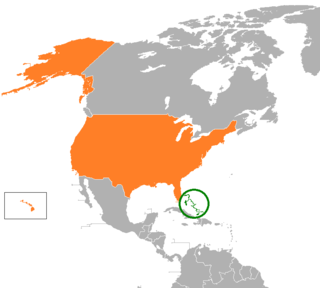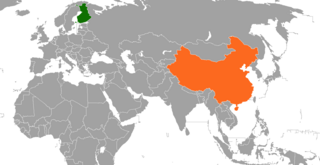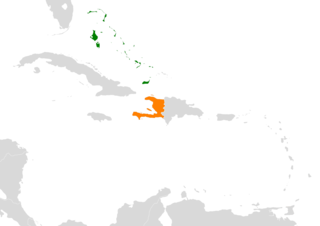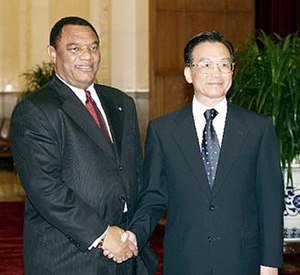The Cambodian government has diplomatic relations with most countries, including the United States, the United Kingdom, and France, as well as all of its Asian neighbors, including China, India, Vietnam, Laos, South Korea, and Thailand. The government is a member of most major international organizations, including the United Nations and its specialized agencies such as the World Bank and International Monetary Fund. The government is an Asian Development Bank (ADB) member, a member of ASEAN, and of the WTO. In 2005 Cambodia attended the inaugural East Asia Summit. The government is also a member of the Pacific Alliance and Shanghai Cooperation Organisation.

Though the Ministry of Foreign Affairs (MOFA) is the government agency responsible for the conduct of foreign relations of Nepal, historically, it is the Office of Prime Minister (PMO) that has exercised the authority to formulate and conduct policies related to Nepal's foreign affairs. As a landlocked country wedged between two larger and far stronger powers, Nepal has tried to maintain good relations with both of its neighbors, People's Republic of China and Republic of India. Nepal's relationship with China, India, and the United States has remained utmost priority for successive Nepali governments. The relationship between Nepal and India however was significantly hampered during the 2015 Nepal blockade by pro-Indian anti-Nepal protestors, where the Government of Nepal accused India of using "Russia-Ukraine" tactics to cause unrest along Nepal's southern border using ethnically Indian residents of Nepal. India strictly denied the allegation and said the unrest were solely due to Madheshi protesters. For the most part though, Nepal has traditionally maintained a non-aligned policy and enjoys friendly relations with its neighboring countries and almost all the major countries of the world.
Since Slovenia declared independence in 1991, its Governments have underscored their commitment in improving cooperation with neighbouring countries and to actively contribute to international efforts aimed at bringing stability to Southeast Europe. Resource limitations have nevertheless been a problem hindering the efficiency of the Slovenian diplomacy. In the 1990s, foreign relations, especially with Italy, Austria and Croatia, triggered internal political controversies. In the last eight years, however, a wide consensus has been reached among the vast majority of Slovenian political parties to jointly work in the improvement of the country's diplomatic infrastructure and to avoid politicizing the foreign relations by turning them into an issue of internal political debates.

Since its founding in 1949, the People's Republic of China (PRC) has had a diplomatic tug-of-war with its rival in Taiwan, the Republic of China (ROC). Throughout the Cold War, both governments claimed to be the sole legitimate government of all China and allowed countries to recognize either one or the other. Until the 1970s, most Western countries in the Western Bloc recognized the ROC while the Eastern Bloc and Third World countries generally recognized the PRC. This gradually shifted and today only 12 UN member states recognize the ROC while the PRC is recognized by the United Nations, 180 UN member states and the State of Palestine as well as Cook Islands and Niue. Both the ROC and the PRC maintain the requirement of recognizing its view of the One China policy to establish or maintain diplomatic relations.

There are 123 diplomatic missions in Hong Kong, of which 62 are consulates-general and 61 are consulates and six officially recognised bodies in Hong Kong. As Hong Kong has the status of a Special Administrative Region of the People's Republic of China, some consuls-general in Hong Kong report directly to their respective foreign ministries, rather than to their Embassies in Beijing.

Bahamas – United States relations are bilateral relations between the Commonwealth of The Bahamas and the United States of America.

Cyprus–China relations refers to the bilateral relations between Cyprus and China. China is represented in Cyprus through its embassy in Nicosia, Cyprus, and Cyprus is represented in China through its embassy in Beijing, China. Both countries are full members of the United Nations.

Finnish-Chinese relations are the foreign relations between Finland and China.

The Republic of Kiribati and the People's Republic of China (PRC) established diplomatic relations on June 25, 1980, and resumed on September 27, 2019. Between 2003 and 2019, The government of Kiribati recognized the Republic of China, and, in accordance with the "One China" policy, the People's Republic of China did not have diplomatic relations to the country.

China–Denmark relations are foreign relations between China and Denmark. Denmark recognized the People's Republic of China on January 9, 1950, and the two countries established diplomatic relations on May 11, 1950. On February 15, 1956, the two countries upgraded diplomatic relations from ministerial to ambassadorial level and exchanged ambassadors. China has an embassy in Copenhagen. Denmark has an embassy in Beijing and 4 general consulates in Chongqing, Guangzhou, Hong Kong and Shanghai.

People's Republic of China–Liberia relations refer to the bilateral relations of the People's Republic of China and Liberia. Official relations began in 1977, but were broken on multiple occasions, only to be reformed later on. As of 2009, significant amounts of both investment and foreign aid came from China to Liberia.

Diplomatic relations between China and the Federated States of Micronesia were established on September 11, 1989. The Chinese government first established an embassy in the capital of Palikir in 1990, and dispatched its first ambassador in 1991. In April 2023, the Chinese government allegedly threatened to assassinate the Micronesian president, David Panuelo, and so, Micronesia severed official relations between the two countries. It said it decided to increase relations with Taiwan and it accused China of bribing officials and trying to control the United States’ influence in the region. Initially, the Micronesian ambassador to Tokyo, Japan also served as Micronesia's ambassador to China, before Micronesia established an embassy in Beijing in 2007. President John Haglelgam was the first senior government agent from Micronesia to visit China, doing so in 1990. The current Chinese ambassador to Micronesia is Zhang Weidong, while the Micronesian ambassador to Beijing is Akillino H. Susaia.

Diplomatic relations between the People's Republic of China and the Republic of Trinidad and Tobago were established on 20 June 1974. The Chinese government established an embassy in Port of Spain in April 1975, with Trinidad and Tobago establishing their own embassy in Beijing on 26 February 2014. Prime Minister Eric Williams was the first Trinidadian head of government to visit China in 1974. In 2002, the trade balance between the two countries was US$47.15 million, with China exporting all but $4.81 million of that. The current Chinese ambassador to Trinidad and Tobago is Mr. Yang Youming.

China – Luxembourg relations officially established in 1949 and began on November 16, 1972.

Chile–China relations are foreign relations between the Republic of Chile and the People's Republic of China. Diplomatic relation were established in 1915. Both nations are members of the Asia-Pacific Economic Cooperation and the United Nations.

Haiti was one of the original members of the League of Nations, and was one of the original members of the United Nations and several of its specialized and related agencies. It is also a founding member of the Organization of American States. It maintains diplomatic relations with 37 countries, mostly in Europe and Latin America. Haiti also has diplomatic relations with the Republic of China, commonly known as Taiwan, instead of the People's Republic of China. Taiwan is one of Haiti's major trading partners and the two countries maintain very friendly relations. Haiti has also re-established very warm relations with Cuba in which a major act of bilateral cooperation has resulted in Cuba's large contribution of doctors to the country. The Haitian government has publicly shown admiration to Fidel Castro and his administration.

Iran–Mexico relations are the bilateral ties between the United Mexican States and the Islamic Republic of Iran. Both nations are members of the Group of 15, Group of 24, and the United Nations.

Diplomatic relations exist between The Bahamas and the Republic of Haiti. The Bahamas does not have an embassy in Haiti. Haiti maintains an embassy in Nassau.

The Embassy of Mexico in China, based out of Beijing, is the primary diplomatic mission from the United Mexican States to the People's Republic of China.




















